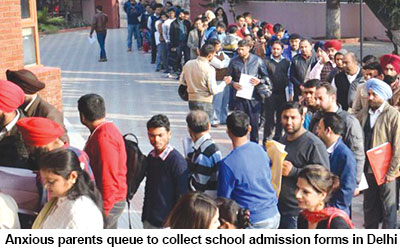Psychologists the world over are warning that chronic parental stress can lead to burnout with disastrous consequences for children – Jayalakshmi Vaidyanathan & Mini P.

“Parental stress is a distinct type of stress that arises when a parent’s perception of the demands of parenting outstrip his or her resources.” — Carina Coulacoglou & Donald H. Saklofske (Psychometrics and Psychological Assessment, 2017)
Most parents are unaware that high stress they experience juggling household chores, child rearing duties, children’s school and co-curricular activities schedules, the workplace, friends and family daily, is now a classified mental health condition. Psychologists the world over are warning that chronic parental stress can lead to burnout with disastrous consequences for children.
In the new era of all-pervasive social media, the pressure millennial parents experience to live up to media glorification of super-parents has intensified. A 2018 survey of 2,000 parents by the well-known Michigan-based breakfast food/cereals multinational Kellogg Company, found that parents clock the equivalent of a full day’s work (ten hours) per week getting their children ready for school. The total number of routine tasks a parent performs every morning adds up to 43, including supervising children’s morning wash and getting them ready for school, packing the school lunch, commuting and even uttering the words “hurry up” more than 500 times per year.
 Rakhi Vashist, a Bangalore-based fashion industry professional and mother of a 15-year-old, is conscious of the price of multi-tasking which is draining her and adversely affecting her physical well-being and workplace productivity. “I am becoming increasingly aware of the toll extracted by never-ending parenting duties and its impact on my professional work. Now with my son writing the class X boards, I am experiencing greater than ever pressure of being the ideal, supportive mother. The onus that he prepares and performs well in the boards is as much on me as on him. This is a time of high stress and fatigue,” says Vashist.
Rakhi Vashist, a Bangalore-based fashion industry professional and mother of a 15-year-old, is conscious of the price of multi-tasking which is draining her and adversely affecting her physical well-being and workplace productivity. “I am becoming increasingly aware of the toll extracted by never-ending parenting duties and its impact on my professional work. Now with my son writing the class X boards, I am experiencing greater than ever pressure of being the ideal, supportive mother. The onus that he prepares and performs well in the boards is as much on me as on him. This is a time of high stress and fatigue,” says Vashist.
According to a 2017 study published in Frontiers in Psychology, 2-12 percent of parents suffer parental burnout, defined as a “unique and context-specific syndrome resulting from enduring exposure to chronic parenting stress”. The study differentiates parenting stress from depression which affects every facet of an individual’s persona. Parental burnout adversely affects parenting duties execution capabilities. Typical symptoms include exhaustion, fatigue, exasperation and emotional distancing from children.
In particular, within India’s stubbornly patriarchal society where child rearing continues to exclusively remain “women’s work”, mothers are expected to be primary care-givers tasked with nappy-changing, school drops, laundry, and cooking. They are obliged to assume the lead role in nurturing children through early childhood, adolescence into adulthood. Unsurprisingly, maternal stress is ubiquitous and visible.
 Dr. Satish Ramaiah, consultant neuro-psychiatrist and sleep disorders specialist at the People Tree Hospitals, Bangalore, opines that in latter-day nuclear households with gadget-dependent children, parenting stress has aggravated. “The breakdown of the joint family and multiplication of nuclear households with both parents work ing has intensified parenting pressure on women who are finding it increasingly difficult to balance parenting and careers. Moreover, the advent of ubiquitous social media and constant sharing of parenting notes has added to their stress. Symptoms of parental burnout include anxiety, depression, anger, sleep deprivation and loss of appetite. Parental stress adversely affects workplace productivity and could damage marriages and alienate children,” warns Ramaiah.
Dr. Satish Ramaiah, consultant neuro-psychiatrist and sleep disorders specialist at the People Tree Hospitals, Bangalore, opines that in latter-day nuclear households with gadget-dependent children, parenting stress has aggravated. “The breakdown of the joint family and multiplication of nuclear households with both parents work ing has intensified parenting pressure on women who are finding it increasingly difficult to balance parenting and careers. Moreover, the advent of ubiquitous social media and constant sharing of parenting notes has added to their stress. Symptoms of parental burnout include anxiety, depression, anger, sleep deprivation and loss of appetite. Parental stress adversely affects workplace productivity and could damage marriages and alienate children,” warns Ramaiah.
Though parenting has always had its pains and strains, parenting 21st century children is an unprecedented challenge. With exponential growth in the number of nuclear households, increasing participation of women in the workforce, rising pressure to keep up with the Joneses (or Patels), and incremental technology dependence forcing lifestyle changes, a rising number of couples are experiencing unprecedented difficulties in discharging their child nurturance obligations. Moreover, urban India’s traffic-choked streets, inefficient public transport, intensely competitive school/college admission processes and lack of child-friendly public spaces compound the stress of double-income working parents.
“External chaos increases internal stress. External factors such as traffic congestion, poor public transport and lack of children’s parks and playgrounds, limit the time that parents can spend with children. Moreover, Indian society is very judgemental with all and sundry given to commenting about parenting styles and blaming negative child behaviour on parents’ especially maternal, neglect. All this adds to parental stress which transfers to children,” says Joy Srinivasan, Bangalore-based president of the Indian Society for Applied Behavioural Science, chairperson of NGO Makkala Jagriti and an expert on organisation development and time management.
 Srinivasan’s warning about stress transference is noteworthy. There’s a huge body of research which confirms that parental stress adversely impacts children’s mental health, leading to mood disorders, addiction, and ADHD (attention deficit hyperactivity disorder) in children. A 2019 study conducted by the Nanyang Technological University, Singapore, says that high parenting stress “blocks maternal sensitivity”, leading to parents strongly reprimanding and/or inflicting corporal punishment on children.“Our study shows that parenting stress weakens mother-child communication and delays children’s social interaction. Our observations stem from the stressed mother’s reduced ability to share her child’s perspective. This inability to appreciate the child’s viewpoint may reduce the quality of parental engagement and undermine the mother-child relationship in the long run,” writes Gianluca Esposito, assistant professor of NTU and senior author of the research study.
Srinivasan’s warning about stress transference is noteworthy. There’s a huge body of research which confirms that parental stress adversely impacts children’s mental health, leading to mood disorders, addiction, and ADHD (attention deficit hyperactivity disorder) in children. A 2019 study conducted by the Nanyang Technological University, Singapore, says that high parenting stress “blocks maternal sensitivity”, leading to parents strongly reprimanding and/or inflicting corporal punishment on children.“Our study shows that parenting stress weakens mother-child communication and delays children’s social interaction. Our observations stem from the stressed mother’s reduced ability to share her child’s perspective. This inability to appreciate the child’s viewpoint may reduce the quality of parental engagement and undermine the mother-child relationship in the long run,” writes Gianluca Esposito, assistant professor of NTU and senior author of the research study.
Similarly, an earlier study published in the American Journal of Psychiatry (April 2016) found that parental anxiety automatically prompts children to become anxious, while anxiety in offspring affects the parenting they receive, thus creating a negative feedback loop.
Given the strong negative impact of parental stress on child development, Dr. Satish Ramaiah (quoted earlier) advises millennial parents to focus on balancing home and office duties, co-opting older children and extended family into sharing tasks and refraining from making comparisons. “Parents should focus on managing their time efficiently and developing coping skills. They should start by mindfully controlling their emotions and accepting home/work problems, learning to let go, making positive affirmations and adopting healthy lifestyles. Most importantly, they should refrain from self-blame and being over-protective of children. Instead they should co-opt spouses, grandparents, extended family, friends as well as children into sharing parenting duties and household chores. In particular, encouraging collaboration, participation and accountability goes a long way in reducing parenting stress,” says Dr. Ramaiah.
 Bangalore-based yoga instructor Ravindra Singh Thakkor recommends meditation and yoga to beat parenting stress. “Low cortisol levels in the body cause anxiety, irritability and fatigue. Yoga exercises balance the secretion of hormones, calm the brain, control anxiety, enable clear thinking, and build patience and stamina. Breathing exercises improve lung capacity and synchronise oxygen levels in body cells. Parents should spend at least 30 minutes practising yoga everyday; the benefits will be huge,” promises Thakkor.
Bangalore-based yoga instructor Ravindra Singh Thakkor recommends meditation and yoga to beat parenting stress. “Low cortisol levels in the body cause anxiety, irritability and fatigue. Yoga exercises balance the secretion of hormones, calm the brain, control anxiety, enable clear thinking, and build patience and stamina. Breathing exercises improve lung capacity and synchronise oxygen levels in body cells. Parents should spend at least 30 minutes practising yoga everyday; the benefits will be huge,” promises Thakkor.
 In addition, nutritionist Dr. Trupti Anandnath K. recommends healthy and well-balanced diets to combat parental burnout. “The first casualty of jam-packed daily schedules is food intake. In the daily struggle to balance home, children and work, parents especially women, tend to sacrifice balanced meals, and skip breakfast. To reduce stress, the three daily meals should be eaten regularly and mindfully. And they should include carbs, proteins, fats, vitamins and minerals. Moreover include fruits, sprouts, and lentils in the family diet. A well-balanced diet and adequate sleep is the prerequisite of parents and children leading stress-free healthy lives,” advises Anandnath.
In addition, nutritionist Dr. Trupti Anandnath K. recommends healthy and well-balanced diets to combat parental burnout. “The first casualty of jam-packed daily schedules is food intake. In the daily struggle to balance home, children and work, parents especially women, tend to sacrifice balanced meals, and skip breakfast. To reduce stress, the three daily meals should be eaten regularly and mindfully. And they should include carbs, proteins, fats, vitamins and minerals. Moreover include fruits, sprouts, and lentils in the family diet. A well-balanced diet and adequate sleep is the prerequisite of parents and children leading stress-free healthy lives,” advises Anandnath.
Finally, the unanimous advice for parents from experts interviewed for this story is — don’t be afraid to ask for help and support from extended family and friends when you need it. The shortest route to exhaustion is trying to do it all by yourself!
 Calming yoga asanas
Calming yoga asanas
Yoga guru Ravindra Singh Thakkor recommends the following exercises to beat stress and anxiety:
• Warm-up with 12 suryanamaskaras — a sequence of 12 asanas which calm and relax the body.
• Sarvangasana or the supported shoulder stand, improves blood circulation, reduces stress and relieves lower back pain.
• Machasana is mandatory after sarvangasana. It increases lung capacity and eases breathing.
• Also try the child, dog, and cat asanas to relax the mind.
• Breathing exercises. Start with deep breathing through both nostrils. Then move on to nadishodhana (alternate nostril breathing); and sheetali, also known as cooling breath.
For detailed instructions on practising these asanas visit yogavibes.com
Helping children cope with exam stress
With board and final school term exams having commenced this month, parent and child stress is at its zenith. Dr. Srividya Vashista, chief of the Advanced Centre for Dental Care at People Tree Hospitals, Bangalore, who also specialises in child psychology, offers parents some tips to mitigate exams stress.
 • Plan study schedules and design time tables
• Plan study schedules and design time tables
• Provide children access to aptitude testing and career guidance counselors
• Encourage open discussions to understand children’s academic challenges, learning styles and how best to adapt them to suit the household routine
• Correct irrational beliefs and perceptions children have about their own capabilities
• Tell children it’s alright to fail sometimes, and that failure is often the stepping stone to success
• Help children develop positive self-image by focusing on their strengths rather than weaknesses
• Encourage them to see the big picture instead of hinging their happiness and expectations on one examination
• Share personal experiences of how you managed to overcome exam fear, and encourage extended family and friends to share similar stories
• Consult a counselor if you are unable to alleviate stress, and children are exhibiting symptoms of depression and anxiety
Parent stress scale
Parents can assess their stress levels! Answer this short questionnaire indicating the degree to which you agree or disagree with the following statements by writing the appropriate number against each statement.
1 = Strongly disagree 2 = Disagree 3 = Undecided 4 = Agree 5 = Strongly agree
1. I am happy in my role as a parent.
2. There is little or nothing I wouldn’t do for my children if necessary.
3. Caring for my children sometimes takes more time and energy than I have to give.
4. I sometimes worry whether I am doing enough for my children.
5. I feel close to my children.
6. I enjoy spending time with my children.
7. My children are an important source of affection for me.
8. Having children gives me a more certain and optimistic view for the future.
9. The major stressor in my life is my children.
10. Having children leaves little time to enjoy life.
11. Having children has been a financial burden.
12. It is difficult to balance different responsibilities because of my children.
13. The behaviour of my children is often embarrassing and/or stressful.
14. If I had to do it over again, I might decide not to have children.
15. I am often overwhelmed by the responsibility of being a parent.
16. Having children has meant having too few choices and too little control over my life.
17. I am satisfied as a parent.
18. I find my children enjoyable.
Scoring
To compute the parental stress score, statements 1, 2, 5, 6, 7, 8, 17, and 18 should be reverse scored as follows: (1=5) (2=4) (3=3) (4=2) (5=1) while others scored normally. Total all the item scores. Possible scores on the scale range between 18-90. High scores on the scale indicate greater parent stress
Source: Berry, J.O, & Jones, W. H. (1995) — The Parental Stress Scale: Initial psychometric evidence.
























